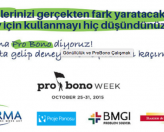
The phrase that affected me most on what volunteering for social causes adds to people’s lives is from the book “Man's Search for Meaning” by Prof. Dr. Viktor Frankl.
“When it comes to meaninglessness; even if it is over simplifying it, one may say there are many things to enable people to live but nothing that people would live for. People have tools but no goals. I especially refer to the masses that are unemployed. Fifty years ago, I published a research on a specific kind of depression I observed in young patients who complained from what I call “unemployment neurosis”. In this research, I was able to show that the neurosis resulted from a dual false identification: being unemployed was identified with being useless and being useless meant a meaningless life. As a result, when I convinced the patients to volunteer for youth clubs, public libraries and similar jobs and they started filling all their free time with a meaningful task free of charge, although their economic conditions didn’t change and they still felt hungry, they were relieved from depression. What can be concluded is that wealth is not the only thing that keeps people going.”
Yes, I also believe that working voluntarily contributes more to volunteers rather than the non-governmental organizations and social initiatives that need such volunteers.
The issue of working as a volunteer has evolved a lot in the last decade. Now many NGOs have their university volunteer groups. NGO voluntary working hours are counted as course credits at some universities. There are even students coming from universities abroad to work as volunteers at NGOs in Turkey. We can now say there are NGOs working with thousands of volunteers.
It is required to be engaged in a cause to work as a volunteer. People can carry out voluntary work in topics that are important to them. This voluntary activity is not actually dependent on a particular period of time. Indeed, we are talking about the period of time which the volunteer can spare from his or her free time for that particular activity. It is needed to allocate more time to serve at certain committees or work under certain titles at some of the associations; however people are actually sparing some of their free time. We can tell that volunteerism is an amateur activity. If you cannot spare that time you previously considered to spare, those activities will be disrupted but it will not create a professional problem for you. Only perhaps you will not be first person to come to mind to serve at committees in the future or not be preferred to obtain certain titles at that NGO. Yes, you did cause some disruption in the works of that NGO, but your absence was probably backed up.
There are two detections I have observed about being a volunteer. The first one is that the continuity expectation at NGOs may sometimes lead to demotivation in the volunteers. The second detection is that there are people who have their names included as a volunteer only to be visible in the big picture, just to see their names among the volunteers in the NGO’s activity report but who do not even attend the meetings about the issues they volunteered for. NGOs can transform the volunteers’ energy to success only when they have a very good volunteerism policy.
There is also the expression of working ProBono. Meaning “for the public good” in Latin, you probably heard of this expression in American movies or series when attorneys would provide ProBono service for social issues in particular or for people who cannot afford the attorney fees. Working ProBono means providing your professional service for a social cause, or to a person or an institution that cannot afford to pay the fees for the service to be received. The main aspect that differentiates ProBono from voluntary work is that volunteers are providing amateur service while those working on ProBono offer service in a totally professional way. It is also something voluntary to work ProBono, but the main point here is that there is no difference in the quality or diligence exerted in the service, regardless of being charged or provided for free. Lawyers first come to our mind when we think of ProBono service; however a lot of financial workers such as financial consultants, accountants, web designers, project managers, management coaches, advertisers, graphics designers, architects, trainers are included under this umbrella in the world.
There is no regulation in the Turkish laws about working ProBono. For example, accountants, according to their regulations, cannot provide service for a fee under the tariff even if their location of service is an association. However, they may refund the fee they charged to the NGO as a donation and hence provide free service to the NGO. In certain practices abroad, there are cases in which the ProBono service is considered as a donation and deducted from tax. In some countries, offering ProBono service for a particular time in a year is a requirement for certain professions.
In my opinion, the most important part of working ProBono is the desire to really access deep information about the NGO for which the person will provide service. One reason for this desire of people working ProBono is to learn about the NGO’s purposes, transparency and accountability. Another reason is to have an opinion that ProBono service they offer will not be useless, the NGO will conduct its share of the work completely and in time and the project will be successful.
Wishing that the number of those offering ProBono service to NGOs and social initiatives in Turkey increases, I also recommend following C@rma (https://4carma.com/), the only institution in Turkey to bring together both sides.
Kind regards,
Besim Çalışkan
Certified Public Accountant
bc@besimcaliskan.com














